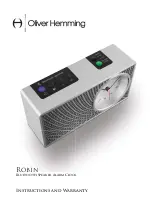
Green LED
n
AC Mains-ON Indicator:
indicates that the unit is operating with AC power. If
this LED goes out, it indicates that the AC power is off.
False Alarm Hush Control Feature:
n
This smoke alarm has the capability of being temporarily desensitised for
approximately 10 minutes.
n
If the smoke alarm is sounding it can be desensitised by pressing the
“HUSH/TEST” button on the smoke alarm cover.
n
After pressing the “HUSH/TEST” button, the alarm will silence immediately
and red LED will flash every 15 seconds for approximately 10 minutes to
indicate the alarm is in the temporary desensitised condition.
n
The smoke alarm will automatically reactivate after approximately 10
minutes and sound the alarm if particles of combustion are still present.
n
The “HUSH” feature may be used repeatedly until the air has cleared.
TESTING
NOTE: Before testing, make sure that the smoke alarm is connected to AC
power supply (make sure the green LED is ON) and there is a 9V battery
properly installed.
n
Test alarm by pushing and holding the test “HUSH/TEST” button for 5
seconds. This should sound the alarm if all electronic circuitry and horn are
working.
n
If no alarm sounds, check battery wiring, fuses or circuit breaker and make
certain that alarm is connected to a continuous final sub-circuit.
n
With interconnected units, holding test button down on one unit will cause
all connected units to sound.
n
Continuous chirping or erratic noise or low sound from an alarm may
indicate a defective alarm.
Smoke alarm should be tested on a monthly basis. To accurately test the
integrity of the sensing chamber use a smoke detector (aerosol) tester.
NOTE:
After the above alarm test with the ‘HUSH/TEST’ button, the alarm will
be desensitised for about 10 minutes.
ONLY DO THE SMOKE AEROSOL TEST
AFTER THIS DESENSITISED PERIOD.
WARNING:
Do not apply excessive force on the “HUSH/TEST” button this may
damage the smoke alarm and may void the warranty.
WARNING:
Never use an open flame of any kind to test your alarm. You may
damage the alarm or set fire to your home. The built-in test switch enables
testing of all electronic components and the horn.
MAINTENANCE
The smoke alarm is virtually maintenance free. However, under dusty or
greasy conditions, a vacuum cleaner may be used to clean the exterior of unit
(including slots on cover).
DO NOT IMMERSE IN OR SPRAY WITH HOUSEHOLD
CLEANERS.
If the unit gives a chirping sound every 60sec the battery may need to be
replaced.
Mounting Instructions:
1.
Write down the date of installation on label provided.
2.
Strip the Active/Neutral and Interconnect (if used) wires back to the strip
length shown above.
3.
Connect the wires to the correct terminals on the base as indicated and
ensure the screws are fully tightened.
4.
Clip the flap closed to prevent accidental contact with the live terminals.
5.
Screw the mounting base to the ceiling or wall using the plugs and screws
provided or No.6/No.8 superscrews.
6.
Install the 9V battery. The smoke alarm will not latch to the base unless
battery is installed.
7.
Turn on the mains power and check the green and red LED function. Green
LED should glow to show main power present. Red LED will pulse every 60
seconds to indicate correct operation and the 9V battery is OK.
8.
Press the Test/Hush button for 5 seconds to check the alarm works.
9.
When installing onto a wall the mounting hinge must be on left hand side.
Battery:
BATTERY INSTALLATION
n
The smoke alarm uses one 9V battery to automatically provide
back-up power to the alarm if AC power fails. The battery will operate the
alarm for approximately one to three months with AC power off.
n
USE ONLY BATTERIES AS SPECIFIED IN THE PRODUCT LABEL. USE OF A
DIFFERENT BATTERY MAY HAVE A DETRIMENTAL EFFECT ON OPERATION
OR MAY CAUSE THE BATTERY TO EXPLODE.
n
USE ONLY THE FOLLOWING 9-VOLT ALKALINE BATTERIES FOR
REPLACEMENT: EVEREADY/ENERGIZER 522 DURACELL MN1604, MX1604
n
Battery can only be inserted in one direction. Ensure polarity is correct.
BATTERY REPLACEMENT
n
To replace battery, unlatch unit from mounting base and remove the battery
from compartment. Replace the old battery with a fresh one and close unit.
Verify that the green LED is on.
n
To ensure proper operation, the battery should be replaced once a year.
n
Smoke alarm cannot be closed properly without battery in place.
PROFESSIONAL IONISATION / PHOTOELECTRIC SMOKE ALARM
INSTALLATION INSTRUCTIONS
Installation:
n
Terminals at back of mounting base are marked as follows:
A - Active I - Interconnect N - Neutral E/Loop - Earth or Loop
EXAMPLE OF MULTIPLE ALARM WIRING:
When interconnected, all smoke alarms will sound upon activation. However,
only the originating smoke alarm will have flashing Red LED.
WARNING:
Connecting the Interconnect terminal to any supply conductor will
result in damage to the alarm, failure to operate or shock hazard and will void
the warranty of the alarm.
WARNING:
Under no circumstances must an insulation resistance test be
carried out on a circuit to which a smoke alarm is connected.
The test could cause irreparable damage to the internal circuitry of the smoke
alarm and make it inoperative.
The warranty would be void under such circumstances.
I
A
N
I
A
N
E/LOOP
I
A
N
E/LOOP
40mm
10mm
CEILING / WALL JUNCTION
TYPICAL MULTIPLE
FLOOR INSTALLATION
SINGLE FLOOR
APEX OF
SLOPING
CEILING
CEILING
ACCEPTABLE HERE
BEDROOM
BEDROOM
BEDROOM
W/C
KITCHEN
DINING
BATH
BD/RM HALL
BD/RM
KITCHEN
RUMPUS
LOUNGE
ROOM
LOUNGE ROOM
Smoke alarms for minimum protection.
Smoke alarms for additional protection.
BEST
HERE
NEVER
HERE
HEAT &
SMOKE
FROM
FIRE
HEAT & SMOKE
FROM FIRE
DEAD AIR
SPACE
DEAD
AIR SPACE
SIDE WALL
300mm min
300mm mi
n
600mm mi
n
1500mm max
500mm mi
n
500m
m
min
BEST
HERE
BEST
HERE
Operation, Testing and Maintenance:
OPERATION
The smoke alarm is operational once all wires are properly connected, the
smoke alarm is correctly installed on the mounting base, battery inserted and
the alarm has been tested. There are two LED indicators. Each of them has a
unique function:
Red LED
n
Stand-by condition:
will flash once approximately every 60 seconds to
indicate unit is functioning properly.
n
Alarm condition:
will flash quickly when unit goes into alarm. The flashing
red LED and pulsating alarm will continue until the air is cleared. For
interconnected units, the originating smoke alarm red LED will be flashing.
All other units will sound but not flash.






















